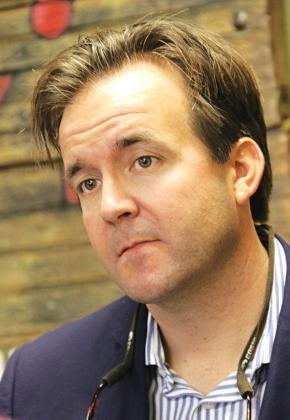
Harlan Kirgan
On the heels of a special session that filled a $304 million state budget hole, Rep. Phillip DeVillier said more cuts are on the horizon when legislators take up the 2017-18 budget.
“I’m telling you and the message needs to get out ... we are going to make serious cuts...” he said at a Eunice Kiwanis Club meeting Thursday.
Temporary taxes, such as a 1 percent sales, are about to expire, he said as an explanation for the next round of budget crisis.
“We can’t continue to grow a state budget and we don’t have the revenues to support it,” he said.
DeVillier is in his first term as District 41 representative and has already been called to three special sessions.
“Let’s fix it,” he said of his thinking about the ongoing state budget woes after a little more than a year in office.
“We can’t have what is called a continuing resolution budget year after year that adds 13 percent to what we are doing today. If we can’t afford what we have now and we continue with a continuation budget that adds 13 percent, where’s the common sense in that?” he said.
The solution is a transparent budget with well-defined priorities, he said.
“We have to stipulate year over year budget reductions that will make Louisiana one of the top states with the lowest cost of government per citizen. Common sense,” he said.
The state needs tax reform that creates a substantial revenue stream and a broader tax base that fosters business and job growth, he said.
DeVillier said the education system should prepare students to create a strong middle class and eliminate impenetrable barriers that keeps people in poverty.
Louisiana’s tax system is ineffective and unstable, he said.
The movie tax credit is an example of bad tax policy because it gives more than the state receives.
And, an example of tax instability is a $12,500 credit to install residential solar energy units. The solar tax credit program was cancelled halfway through the program, he said.
“They were expecting to get $12,500 back to buy this solar system then the state took it away. I don’t think that’s fair and that’s what we do in Baton Rouge,” he said.
DeVillier said some people are disappointed the Legislature turned to the Rainy Day Fund to solve the $304 million deficit, but legislators avoided raising taxes and fees.
Another wrinkle in the budget was departments were told to reduce their budgets by 5 percent, but many departments were impacted by the August flooding that forced expenditures up.
“The beauty of the matter is we were able to get out of the session without raising any taxes, any fees, we saved cuts to higher education, K through 12 and LDH,” he said.
Legislators also passed a resolution that calls for 3 percent of constitutional and statutory dedications be used to pay debt service. The resolution will generate from $90 million to $96 million for debt payments, he said.
“That’s what we bargained for. We will give you ‘X’ amount of dollars of Rainy Day if we get ‘X’ amount of dollars back in bond redemption,” he said.
Departments have been told to be prepared to operate more efficiently, he said.
“You know it is not fun to receive call after call from school boards and teachers, hospital administrators, people in the court system, saying ‘please don’t cut me, please don’t cut me,’” he said.
“If we have the best tax structure and bring the biggest businesses here you are not going to have families come if you don’t have schools to educate those kids,” he said. “If you don’t have schools to educate those kids you are not going to have people to drive around on the roads because they are all busted up. You not going to have anyway to give them health care because the hospitals are all shut down. It has to be a whole systems approach to how you look at things.”
